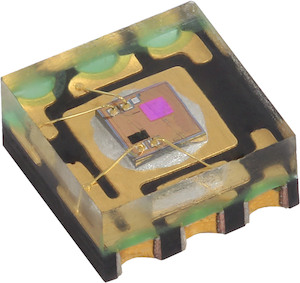VEML3235 Ambient Light Sensor
The veml3235 sensor platform allows you to use the Vishay VEML3235 ambient light sensor with ESPHome.
Communication with the device is over I²C, which must be present in your configuration.

This sensor provides a 16-bit dynamic range for ambient light detection ranging from 0 lx to nearly 18 klx, with a
resolution as small as 0.0021 lx/counts. It achieves that range by having two configurable gain values and a range
of integration times. For many applications, you can enable auto gain to have ESPHome select a suitable gain setting
based on the previous measurement. If light levels change dramatically, the next reading may saturate, after which the
gain will be adjusted to bring subsequent readings back in range. In general, use higher gain values and/or longer
integration times when measuring less intense light sources.
This Wikipedia article has a table of some lux values for comparison.
Values reported are in units of lux, but understand that measurement of any lux value requires careful calibration
for the light frequency or frequencies under measurement, conversion coefficients for the specific device, and other
factors. In short, to really get a true lux value measurement, you should do a laboratory-grade calibration specific
to your use case. If you are the sort of person who can do a laboratory-grade calibration, you probably knew all of
that already. Still, you can still get values that will be “in the ballpark” without calibration. This is especially
true if you just want to distinguish among “no light”, “a little bit of light”, “a lot of light”, etc.
# Example configuration entry
sensor:
- platform: veml3235
id: veml3235_sensor
name: VEML3235 Light Sensor
auto_gain: true
auto_gain_threshold_high: 90%
auto_gain_threshold_low: 20%
digital_gain: 1X
gain: 1X
integration_time: 50msConfiguration variables
gain (Optional, string): The gain the device will use. Higher values are better in low-light conditions. You cannot specify an arbitrary gain multiplier. It must be one of:
1x(default)2x4x
digital_gain (Optional, string): Similar to
gain; provides an additional multipler, further increasing range. You cannot specify an arbitrary digital gain multiplier. It must be one of:1x(default)2x
integration_time (Optional, Time): The time the device will use for each measurement. Longer means more accurate values. You cannot specify an arbitrary amount of time. It must be the equivalent of one of:
50ms(default)100ms200ms400ms800ms
auto_gain (Optional, boolean): When set to
true(the default),gain,digital_gainandintegration_timewill be adjusted automatically to avoid saturating the sensor and allow use of the maximum possible resolution; if these values are included in the configuration, they will be used as initial values only.auto_gain_threshold_high (Optional, percentage): A percentage of the maximum possible lux measurement given the current gains and integration time; when the lux measurement climbs above this value, the
gain,digital_gainandintegration_timevalues will be reset and recalculated to avoid saturation and maximize resolution. The default value is90%.auto_gain_threshold_low (Optional, percentage): A percentage of the maximum possible lux measurement given the current gains and integration time; when the lux measurement falls below this value, the
gain,digital_gainandintegration_timevalues will be reset and recalculated to avoid saturation and maximize resolution. The default value is20%.All other options from Sensor.

